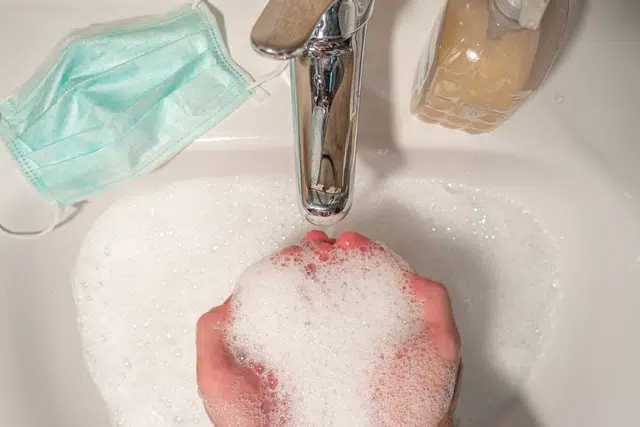A pandemic changes everything about your life. But what if it unearths all of your buried fears? That’s the current reality for citizens diagnosed with OCD.
IS OCD THAT SERIOUS?
The term OCD is casually dropped in conversation about a friend with a type-A personality or is mentioned about that colleague who has color-coded and labeled everything in their office. There’s even a Rhett and Link parody song about the disorder (which is funny, but may not be the most respectful approach to the topic). But in reality, OCD impacts a person’s life more than an organized planner that looks pretty; it’s about being intolerant of uncertainty.
According to the most recent diagnostic manual, Obsessive-Compulsive Disorder (OCD) is the “presence of obsessions, compulsions, or both.”
Obsessions are intrusive, unwanted, and “persistent thoughts, urges or images” which cause anxiety and discomfort. As you can imagine, the individual tries to ignore these obsessions.
Like obsessions, compulsions provoke anxiety and distress but are not due to a separate mental disorder or physiological impact. These disturbances consume significant time (typically more than one hour per day) and impair social, occupational, and daily life tasks.
To further break down OCD, there are six subtypes:
- Checking: This is the most common type of OCD. Obsessive habits like locking and unlocking the door, turning the water on and off, or constantly researching information. This often stems from mental anxieties.
- Contamination: This fear of getting sick prevents individuals from going outside, into a crowded place, visiting a hospital, or touching surfaces that may be contaminated. This type is usually caused by emotional damage.
- Mental Contamination: This isn’t about physical contamination, but mental uncleanliness. Psychological hurt causes someone to persistently wash their body or compulsively repeat habits.
- Hoarding: TLC shows aside, this diagnosis is when someone can’t get rid of an item and therefore collects vast amounts of useless things, yet has trouble keeping it all organized.
- Ruminations: These are thoughts that someone continuously chooses to think about over and over for significant hours of the day. These typically center around unproductive thoughts.
- Intrusive Thoughts: These are unwanted thoughts that disturb the individual, and can include things like sexuality, magic, religion, violence, or symmetry.
OCD PRE-PANDEMIC
Compulsive behaviors and obsessive habits are not a recent diagnosis. In fact, the World Health Organization ranks OCD as the tenth leading cause of disability worldwide. People have been receiving treatment and assistance with this for years.
OCD DURING A PANDEMIC
But here we are, smack dab in the middle of a worldwide pandemic. Nearly every single country, culture, economy, and person has had their daily life impacted by the COVID-19 virus. How does this affect a citizen with OCD?
- For the person who feared germs and obsessively washed their hands, they are living their worst nightmare.
- For the person who hoarded extra food, they are now stockpiling even more resources.
- For the person who couldn’t step foot in a grocery store or hospital, they are now drowning in even more fear.
- For the person who obsessively studied the news, they now can’t satiate the desire for more information.
For the person diagnosed with OCD who has kept their volcano of symptoms in an inactive state, their diagnosis is now like spewing lava unearthed from a never-ending source.
First of all, don’t centralize around common pandemic strategies such as washing your hands or avoiding crowds of people. Why? Because a patient with OCD already orients their life around those pillars.
6 STRATEGIES TO TURN YOUR OCD VOLCANO FROM ACTIVE TO DORMANT–IN THE MIDDLE OF A PANDEMIC
- Set goals and limits on your activities, with accountability, such as only watching the news for one hour per day. Watch things and engage in things that make you laugh and produce positive, happy feelings.
- Practice meditation, deep breathing and relaxation techniques to reduce your stress and lower your anxiety.
- Reduce your obsessions and compulsions. For example, if you have been washing your hands for ten minute at a time, drop that time to nine minutes, then eight, and so on until you can give your hands a solid cleaning in only one or two minutes.
- Stay in relationship with other people. And give yourself the freedom to not discuss the elephant in the room.
- Schedule separate tasks, like cleaning your windows, organizing your closet, or painting a bedroom.
- Get outside every day. Open your windows, eat on your porch, take a walk in your neighborhood, or take a Springtime drive with the windows down.
OCD POST-PANDEMIC
Will life ever return to normal? That’s a rhetorical question that a lot of leaders are asking. But imagine asking a question like that from the position of a patient with OCD.
Will I ever get these symptoms under control?
What if this pandemic comes back, or never really went away?
What can I do to prevent this from happening again?
If I stop [insert obsession or compulsion here], will I get sick?
There is hope that this pandemic will end, that life will return to normal, and that a patient with OCD will gain freedom.
EXPERIENCING OCD DURING THIS PANDEMIC? WE CAN HELP.
It’s tough to set healthy goals and limits for yourself when your OCD swirls around in your head like a pool of bubbling lava, ready to blow at any moment. But we won’t leave you to swell down the fiery waters by yourself.
If your OCD volcano is erupting, we can help. Contact our team and tell us which of your obsessions or compulsions are raging right now. Together we can help you lessen the symptoms so you can live a normal life in the midst of a pandemic.
Redeemed Life Counseling, LLC
Redeemedlifecounseling.com
940.222.8552
Follow us on instagram and Like us on Facebook
Teen Social Anxiety

